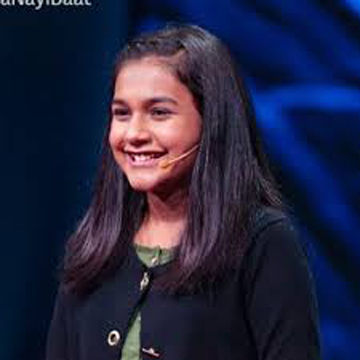NEW YORK (TIP): Time magazine’s first ever ’Kid of the Year’, Indian American scientist and inventor Gitanjali Rao has been named by Germany based Faces of Democracy initiative as its ‘100th face of democracy’.
The 15-year-old young, who won the Time honor for developing a device that can warn of lead in drinking water and an app that detects “cyberbullying” on the internet, has described democracy as a “core value for the common good of people.”
“It is how we have been brought up, so it is the core value for the common good of people,” Rao told Sven Lilienström, founder of Faces of Democracy in an interview focused on democracy, educational equality and how science can regain peoples’ trust.
Asked how she felt on learning she had won Time’s 2020 Kid of the Year title over 5,000 competitors, Rao said, “It was a surreal moment. I’m honored, humbled, and beyond excited to be named Kid of the Year!
“There’s something so exciting about being able to share your story and I’m representing kids from all walks of life, no matter their gender, their age, or where they come from,” she said. “I’m hoping that I can prove anyone can be an innovator.”
Time and Nickelodeon, Rao said, “have done an amazing job highlighting optimism, kindness, positivity, especially in these tough times, especially highlighting the work of our generation. Each of us has different talents and we try to light up the community with whatever we can.”
Describing basic human rights such as clean water, clean air as “our biggest problem”, Rao said, “We need to solve the problem of contamination of natural resources by treating, preventing, and detecting them.”
Asked if science needs to become younger and increasingly ‘female’, Rao said, “I believe the ingenuity of youth needs to be harnessed and Universities and Organizations should open up their doors for us.”
“Research labs, internships, and other opportunities to explore should not be limited to adults if we want to encourage a problem-solving mindset,” she said. “Traditional education needs to start incorporating innovation at an early stage.”
“In terms of females, there are several girls in STEM organizations, but the majority of them are introduced to coding and programming,” Rao said. “I believe there needs to be a shift in how girls are introduced to STEM.”
“They need to see a connection to the real world and should be introduced to the latest technologies broadly,” she said. “They can then choose their areas of interest and go deep into it.”
Asked what her generation can change to make education in the US fairer, Rao said, “I recognize there is an inequality in education. Some schools barely have internet access while others have 3D printing labs.”
“My innovation workshops are a small step in sharing with rural schools and other underprivileged schools that you can start anywhere, start with a simple idea, and reach out to mentors who may provide you more access to materials and experts.”
”You need not be limited to what the school provides. If you have a phone, there is no excuse to not reach out or say that we were not given a fair chance,” Rao said.
“I believe science is a fact, but it needs to be communicated well to bring about a social change and a feeling of trust,” she said when asked how science can regain peoples’ trust in these coronavirus times.
“The more we educate and bring awareness to people with facts, causes, and effects, the more it gains trust. For example, when I started researching for Tethys, the lead detection tool, people knew about the lead in drinking water in Flint,” Rao said.
“Just three months into my research, I found that there are several states, communities, and part of the world with the same issue, but it just didn’t gain enough attention.”
“As we try to solve problems using science, bringing awareness to these problems are equally important,” Rao said. “When Universities work on research, I believe awareness should go hand in hand for people to gain trust.”
Indian American Gitanjali Rao named Faces of Democracy’s 100th face

Germany based Faces of Democracy initiative has named Gitanjali Rao as its ‘100th face of democracy’.